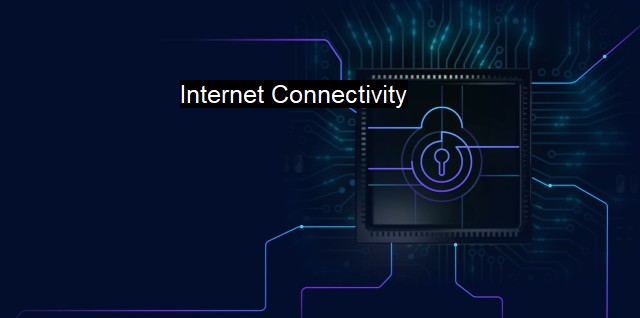What is Internet Connectivity?
The Vital Importance and Potential Dangers of Internet Connectivity: An Analysis of Cybersecurity and Antivirus Measures
Internet Connectivity as a term broadly refers to the various ways computers, smart devices, servers, and other digital apparatus have to connect, send, and receive data and information from the Internet. It encompasses different types of fixed and mobile data transmission technologies such as broadband, Wi-Fi, Ethernet, Fiber, 5G, satellite, and dial-up, which enable users across the globe to access the breadth and depth of information and resources available on the Internet.As Internet Connectivity has improved and become more accessible, cybersecurity vulnerabilities have dramatically increased, leading to extensive concerns over virus attacks and the integrity of wireless connections. Mobile and desktop devices connect to a myriad of online service providers, introducing digital gambling, web applications, cloud services, social media, online trade and brokerage, digital broadcasting, etcetera, foreboding a greater risk of cyberattacks.
These cyberattacks often exploit vulnerabilities in networking equipment, software, applications, or outdated protocols via an Internet connection, adversely affecting organizations, governments, and unsuspecting internet users. Cyberattacks steal, destroy or alter sensitive and private data—infringing on intellectual property, identity, and financial security of companies and individuals-as well as technical infrastructure in worst-case scenarios—causing disruption of services.
As a means of protection and to mitigate multiple cybersecurity risks, Internet Connectivity must therefore be paired with robust antivirus and other cyber defense mechanisms to protect users and their data from petrifying cyber threats, hence placing cybersecurity hand in hand with Internet Connectivity.
Antivirus software is a program designed to prevent, scan for, detect, and remove viruses and other malicious software like worms, trojans, adware, and more. They are essentially the basic defense line in the increasingly complex cybersecurity infrastructure to assess the software's behaviour in real-time and compare it with known malware to detect new threats.
Apart from antivirus software, cybersecurity measures also incorporate tools for secure communication, data encryption, secure access, Intrusion Prevention Systems (IPS), firewalls, controlling uncontrolled internet connectivity, and maximizing secure Internet Connectivity.
Of increasing importance with tools like Virtual Private Networks (VPN) ensure secure internet connections even when using public Wi-Fis, enforcing encrypted tunnels for data transmission. best practices by organisations involving updated patches and upgrades of systems, security awareness, and stringent cybersecurity guidelines strengthens internet connectivity.
The reality is that no antivirus or cybersecurity technique guarantees absolute security. Most successful cyberattacks result from human error or negligence, be it an employee clicking on a malicious link or failing to secure a device properly. That's why continuous cybersecurity awareness training stands imperative, especially within businesses that rely heavily on secure Internet Connectivity.
The expansion of Internet Connectivity has showcased a Pandora's box of possibilities, facilitating access to the most remote of information and services in the world. it also presents escalating threats from cyber criminals who exploit gaps in security systems. While antivirus software and other cybersecurity techniques attempt to add layers of protection, the task of securing Internet Connectivity is an ongoing struggle needing a concerted response from technology developers, security experts, businesses, and users alike. In this age of astronomical Internet Connectivity growth, robust cybersecurity measures must always be employed, never neglecting the continual reinforcement of cybersecurity knowledge.

Internet Connectivity FAQs
What should I do if I experience slow internet connectivity?
There are several possible reasons for slow internet connectivity, so you can try a few things to fix the issue. First, check if there are any background downloads or updates running on your device. You can also try restarting your modem or router. Additionally, you may need to contact your internet service provider to troubleshoot any technical issues.How can I protect my internet connectivity from cyber threats?
One way to protect your internet connectivity from cyber threats is by using a reliable antivirus software. This can help detect and remove any malware or viruses that may compromise your online security. Additionally, you should avoid clicking on suspicious links or attachments, and use strong passwords for your accounts.How can I ensure secure internet connectivity on public Wi-Fi networks?
When using public Wi-Fi networks, it's important to take extra precautions to protect your online security. You can do this by using a virtual private network (VPN) to encrypt your internet traffic and prevent unauthorized access to your data. You should also avoid accessing sensitive information, such as banking or social media accounts, on public Wi-Fi networks.What is the role of internet connectivity in cybersecurity?
Internet connectivity is a crucial component of cybersecurity, as it enables the exchange of information and data between devices and networks. However, it also creates potential vulnerabilities that can be exploited by cybercriminals. By ensuring secure internet connectivity and using reliable antivirus software, you can help protect your devices and data against cyber threats.| | A | | | B | | | C | | | D | | | E | | | F | | | G | | | H | | | I | | | J | | | K | | | L | | | M | |
| | N | | | O | | | P | | | Q | | | R | | | S | | | T | | | U | | | V | | | W | | | X | | | Y | | | Z | |
| | 1 | | | 2 | | | 3 | | | 4 | | | 7 | | | 8 | | |||||||